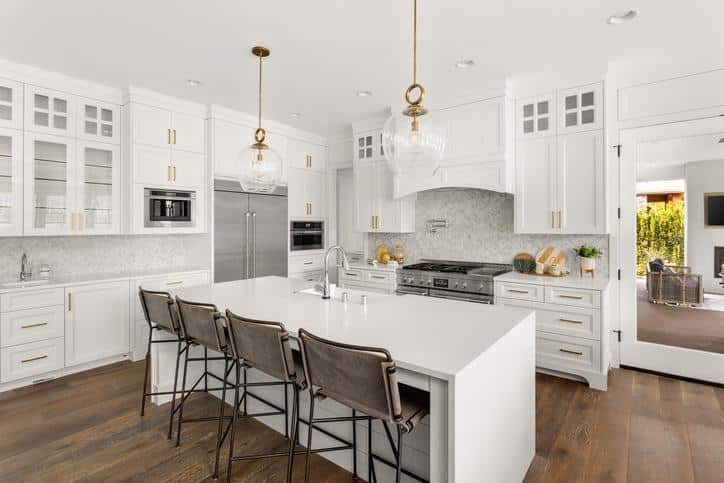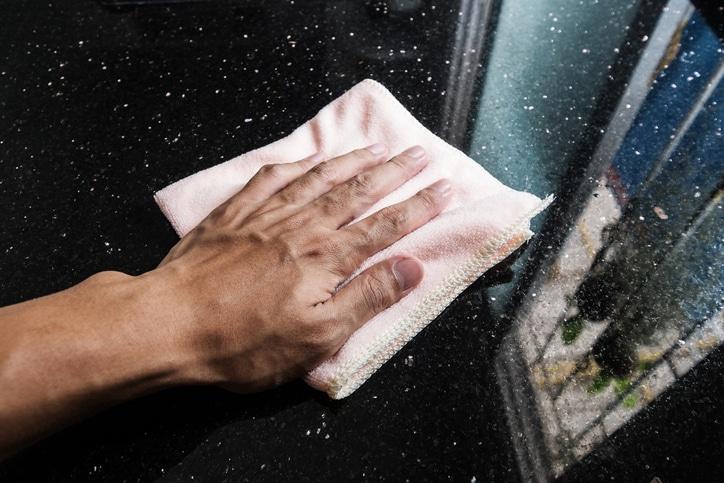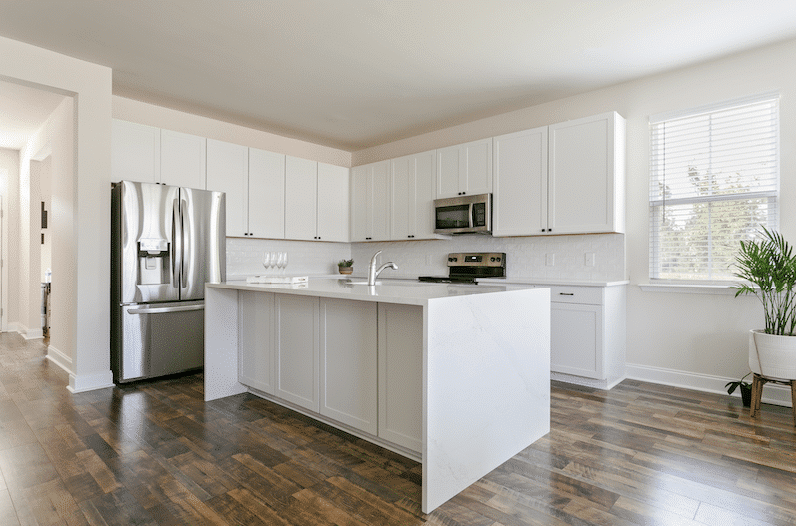Maintain White Countertops in Charleston
Introduction
The elegance of white countertops is why most Charleston houses stick to it. Homeowners love these worktops; they add gracefulness and classicism to any interior. To survive and function well, white countertops have to be well-maintained. We will go over tips on how to maintain white countertops in Charleston SC, or any other location where you might have white countertops installed.

Importance of maintaining white countertops in Charleston
White countertops might be very pretty, but they will get stained, discolored, or damaged if not carefully maintained. Keeping your kitchen or bath elegant requires regular and time-effective maintenance. These maintenance measures ensure that you preserve the worth of your counters and make real estate an advantageous investment.
Region-specific issues
The white countertop in Charleston is troublesome due to the temperature in the area and surroundings. Warm, humid weather in the city encourages the growth of molds and mildew that can spoil white substrates. Like any other coastal town, Charleston should implement measures to prevent saltwater corrosion.
Understanding geographical problems is a crucial requirement for a successful maintenance strategy. The book focuses on Charleston-specific issues and gives special instructions to enable a person to deal with local environmental problems.
Overview of guide
The following is a comprehensive guide on how to keep the Charleston White countertops. This includes daily maintenance activities, seasonal issues, as well as troubleshooting. This guide will elaborate on the characteristics and maintenance of these countertop materials.
There are also examples of actual work experiences, tips, a guide to choosing Charleston-suitable products, suggestions for home improvement, and more. Below are a few guidelines for extending the lifespan of your white countertops. How do we take care of white countertops in Charleston’s lovely environment?
Charleston white countertop types
Marble
Marble is a timeless beauty of Charleston homeowners’ worktops. Marble provides elegance to kitchens and bathrooms with its natural beauty and distinctive veining patterns. Marble is softer than other stones, making it more prone to scratches and etching.
Quartz
Quartz countertops made from natural quartz crystals and resins are durable and low-maintenance. Quartz’s non-porous surface helps prevent mold and mildew in Charleston’s humid environment. It’s stain-resistant and seal-free, making it ideal for busy homes.
Granite
Granite, created by cooling magma, is durable and heat-resistant. Granite countertops are ideal for Charleston’s warm environment since they endure high temperatures. Granite is less porous than marble.
However, sealing improves stain resistance.
Unique traits of each kind
Porosity
- Marble: Marble is porous and absorbs liquids, making it stainable. Sealing reduces porosity and improves stain resistance.
- Quartz: Quartz is non-porous and doesn’t absorb liquids. This makes fabric stain-resistant and bacteria-resistant, which is helpful in humid Charleston.
- Granite: Granite is less porous than marble but still needs sealing to repel liquids. Proper sealing prevents stains and prolongs countertop life.
Substance sensitivities
- Mable: Citrus fruits and vinegar may etch marble. Cutting and chopping must be done carefully to avoid scratches.
- Quartz: Quartz resists acidic chemicals and scratches better than marble. Since it is not scratch-proof, cutting boards are suggested to preserve its look.
- Granite: Granite is less sensitive to acidic etching than marble but still may be. Even though it’s scratch-resistant, avoid cutting directly on it.
Durability
- Marble: Beautiful yet softer, marble scrapes and crumbles easily. Proper maintenance can keep it attractive, but it needs extra attention to prevent harm.
- Quartz: Quartz is durable and scratch- and chip-resistant. It’s ideal for busy areas and bustling kitchens.
- Granite: Granite can endure heat and is a robust kitchen alternative. Even though it scrapes less than marble, it should be protected.
Regular Maintenance
Gentle everyday cleaners: Clean Charleston white countertops gently to maintain their shine. Avoiding surface damage requires the correct products. Use countertop-specific pH-neutral, non-abrasive cleaners:
- Marble: Clean marble using a pH-balanced, mild cleaner. Acidic or abrasive cleansers may etch and damage surfaces.
- Quartz: Daily cleaning generally requires mild dish soap and warm water. Avoid strong chemicals and abrasive pads to protect the resin binder.
- Granite: Use a granite-safe cleanser or mild dish soap and water. Avoid acidic foods like vinegar and lemon juice.
Fast cleanups
Importance of timely spill cleanup:
- Clean up spills quickly to avoid discoloration. White counters, particularly marble, absorb liquids so that timely care may prevent damage.
- Instead of wiping spills, blot with a soft, absorbent cloth or paper towel.
Avoiding stains and discolor:
- Diagnose and treat stains rapidly. If unchecked, acidic chemicals like red wine or tomato sauce may discolor marble.
- Regularly inspect for stains and remove them if required.
Protecting against heat and scratches:
- Always chop and prepare food on cutting boards to avoid countertop scratches. Marble and quartz are scratch-prone; this is crucial.
- Use cutting boards and trivets properly
- Hot pans and pots should be on trivets or pads to prevent countertop contact. Granite is heat-resistant, yet this precaution preserves the polish.
Selecting cutting boards and trivets:
- Wood or soft plastic cutting boards are less prone to harm countertops.
- Use heat-resistant trivets or hot mats to protect the surface from hot cookware.
Clean and examine cutting instruments regularly:
- Check knives and other cutting equipment for damage or rough edges that might scrape the surface.
- Remove food particles and other contaminants from cutting blades to avoid countertop staining.
Deep Cleaning Tips
Regular, thorough cleaning
A regular, thorough cleaning regimen is necessary to keep Charleston’s white countertops shiny and durable. Daily upkeep removes spills and dirt, but a deeper clean keeps your counters looking great.
Deep cleaning frequency:
- Deep clean every 1-2 weeks, depending on use and climate.
- According to your countertop material, marble may need more maintenance than quartz.
The extensive cleaning process:
- Remove clutter from countertops.
- Dust surfaces to eliminate dust.
- Clean with a pH-balanced, mild cleanser for your countertop.
- Check edges and corners for accumulation.
- Rinse well to eliminate residue.
- Dry the countertops thoroughly to avoid wet marks.
Removing tough countertop stains
Common stains:
- Red Wine with Berries: Clean spills immediately and remove stains with baking soda, water, or mild dish soap.
- Coffee and Tea: Blot spills quickly and clean with water and white vinegar.
- Grease and Oil: Absorb and lift stains using baking soda, water, or a degreasing solution.
Specialized stain removal:
- Marble: Make a baking soda-water mixture for oil stains. Mix hydrogen peroxide and a few drops of ammonia for acidic colors.
- Quartz: Soft cloth water and mild dish soap may remove stubborn stains. Skip abrasive pads.
Polishing white countertops
Deciding on polish:
- Marble: Enhance its luster with a marble polish. Avoid surface-damaging acidic or abrasive polishes.
- Quartz: Quartz does not need polishing. However, a non-abrasive, quartz-friendly polish may be used.
- Granite: Enhance its natural brilliance with a granite-safe polish. Avoid acidic or abrasive polishes.
Perfect shine application:
A soft cloth or applicator should apply polish in tiny, circular movements to ensure uniform application.
- For a flawless sheen, buff the surface gently with a clean, dry cloth after letting the polish cure according to the product directions.
- Use the prescribed quantity of polish to avoid residue accumulation, which dulls countertops.
Safety from Charleston-Specific Elements
High humidity issues

Mould prevention:
- Kitchens and bathrooms need appropriate ventilation to minimize humidity. Open windows or use exhaust fans during and after cooking or bathing.
- Clean Down Surfaces: To avoid mold, clean countertops regularly. Watch corners and airless regions.
- Use mold-resistant sealants on moisture-sensitive surfaces and incredibly humid areas.
Airflow advice:
- To move around the air, use ceiling fans. This reduces surface wetness.
- Strategic placement: Set items of furniture and things on your counter to facilitate breathing. Avoid vent and air blocking.
Prevention of seawater exposure
Coastal lifestyle factors:
- Sealant: Seal the countertops to prevent damage by seawater. Reapply sealant per manufacturer’s instructions.
- To remove salt deposits, rinse countertops with fresh water after a storm and saltwater exposure.
- Keep all the appliances out of the reach of the flood waters so that the saline water cannot stay in touch with the property for too long.
Cleanup after storms or flooding:
- Immediately following storms and floods, clean and dry surfaces to preclude moisture effects and mold.
- Inspect for harm: Check countertops for signs of chips and cracks and repair them promptly to prevent further damage.
- Professional inspection: Have the countertops structurally inspected after significant floods or storm damage.
Seasonal Considerations
Summer Care Tips
Countertop sun protection:
- Blinds or drapes can shield worktops from direct sunlight during peak hours. Fading and discoloration are prevented, especially on sun-sensitive materials such as marble.
- Rotate Decor Items: Rotate countertop decorations to avoid uneven fading and equal distribution of sunlight.
Crack prevention hydration:
- Regular Sealing: In summer, granite countertops may dry off. Avoid removing the counter surface sealant during cleanup to prevent dryness, cracking, and flaking.
- Pay close attention to spills and keep yourself hydrated. Use a drink coaster to prevent condensation and soak up spots fast.
Winter Care Tips
Preventing temperature damage:
- Avoid Rapid Temperature Changes: Thermal shocks and cracks can result from placing hot cookware on cold worktops. Use of buffer through trivets and hot pads should be provided.
- Winter Sealant Check: Ensure you inspect your countertop sealants before winter. During cold weather, moisture could make matters worse; thus, it is essential to have a sealed countertop.
Treating Christmas stains:
- Clean up holiday cooking-related stains as soon as they occur. There are a lot of other ingredients, like red wine, cranberry sauce, and oils.
- Protection: Ensure you have cupboards or trivets when preparing holiday meals. Resistant to scratches, stains, and other forms of damage.
Selection of Sealant
Sealing white countertops matters.
- White countertops, regardless of their material, need sealing. The seal will prevent it from getting stained, wet, or damaged. Sealing is also imperative at Charleston due to its high humidity and periodic contact with seawater.
- Sealant prevents contamination of the countertop and staining due to the porous nature. This is important because of the high humidity and airborne particles leading to Charleston’s discoloration.
- Moisture Protection: The absorption of moisture causes mold and damage to counters on surfaces in warm environments. Sealers maintain the water-tightness of the countertops, thus extending their durability.
- The sealed countertops are durable and smooth. This is important for white countertop appeal.
Climate-appropriate sealants for Charleston
Water-based sealants:
Advantages:
- Environmentally friendly: Those with less Volatile Organic Compounds (VOCs) than water-based sealants.
- Application and cleanup: Using water-based sealants is more convenient to apply and wipe them off.
- Suitable for lighter-colored counters: White worktop is not as susceptible to change.
Considerations:
- In particular, humid conditions and frequent passage of people over a surface may require water-based sealant replenishment.
- Despite their effectiveness, water-based sealants are less solid and protective than solvent-based adhesives.
Sealants made of solvents
Advantages:
- More extended protection: Solvent-based adhesives tend to endure longer.
- These are designed to cope with high humidity and make them perfect for the weather conditions of Charleston.
- Many white countertop materials accept solvent-based sealants.
Considerations:
This means there should be some form of ventilation when applying solvent-based sealants due to the harsh smell.
- Countertop material can turn dark due to solvent-based sealants. Try inconspicuous areas first.
Application Tips: - Follow manufacturer guidelines: Use sealant as per sealant manufacturer instructions in application, cure, and reapply.
- Perform a test spot on a small, unnoticeable part of the countertop before using a sealer on the entire surface to ensure adhesion and avoid any negative consequences.
Fixing Common Problems
Discoloration
Determine Cause:
- Determine the cause of discoloration: these stains include food and beverage spills, sunlight, or cleaning agent reactions.
- These can include certain chemicals reacting with others, particularly on marble countertops, thus discoloring.
Techniques to Remove Stains:
- Prepare a poultice with baking soda and water for coffee and wine stains are good. Apply on the color, let dry, and carefully remove.
- Combine water and white vinegar equally for mineral stains (hard water deposits). Wipe after applying and waiting a few minutes.
Help from professionals:
If discoloration continues or you need clarification on the source, professional cleaning and restoration services may be required.
Fixing Minor Scratches
Polish and fillers:
- Use a countertop-specific stone filler or polish for minor scratches.
- Blend the stuffing into the scratch per package directions. Smooth the surface with polish.
Steel Wool for Deeper Scratches:
- Use fine-grade steel wool and a granite or quartz polish for deeper scratches. Rub the scrape lightly in a circle.
- Professional Repair Kits:
- Explore countertop material-specific professional repair kits. These packages generally include scratch-repair solutions.
Fixing Chips or Cracks
Assess Severity:
- Assess the damage. DIY repairs are possible for little chips, but more significant cracks may need expert help.
- DIY Chip Repair: Clear epoxy or a countertop chip repair kit will fix tiny chips.
- Clean the damaged area, add repair material, and blend it to fit the surface.
Expert Repair for Larger Damage:
Larger chips or cracks may need expert repair. Contact countertop restoration experts to analyze and fix the damage.
Measures to prevent:
Do not drop heavy things on the countertop; use a cutting board and place hot utensils on a trivet to avoid chipping.
Assess Root Causes:
- Cracks may signify structural problems. Get in touch with qualified persons if cracks start getting deeper and broader.
- Expert Care
- Professional Consultation When
Severe Damage:
If you have severe scratches, chipping, or cracking of your white countertops, you must consult professionals to repair them. They are in a position to assess the damage, repair, or restoration of affected buildings.
Long-lasting Stains:
When DIY cannot remove stubborn stains, experts opt for unique methods and materials.
- Complex Issues: However, one should seek professional assistance when facing structural problems or countertop support requiring significant corrections exceeding familiar routine maintenance works.
- Periodic Repair: Consulting specialists are recommended for periodic repairs of damaged countertop surfaces. The restoration process involves filling in surface damage polishing, and resealing.
- Keeping your counters clean is extremely important whether living anywhere in Charleston.
Selecting a Good Charleston Countertop Maintenance Service Provider
Specialized in White Countertops
Therefore, white countertop care services should be aware that they are different and require separate procedures to maintain their elegance and genuineness.
Skill and Experience:
Locate a professional outfit that deals with the Charleston homeowners’ countertop material.
Feedback from Customers:
Customer perceptions of service quality have been established through client evaluations and reviews. It involves feedback on services offered, professionalism as well as effectiveness.
License and insurance:
Make sure the maintenance service has a good reputation and insurance coverage. This makes them observe the set industry standards and be insured in case of any unforeseen incidents.
Price Transparency:
Ask for transparent maintenance prices. This way, you can decide on a purchase, and no surprise will catch you unawares.
Custom solutions:
Decide on a specialized cleaning service for the countertop. Different tabletop materials may respond differently to a one-size-fits-all approach.
Long-term Durability Checks
Scheduled Checkups:
Schedule frequent professional inspections. Regular checkups by specialists allow the detection of possible abnormalities before they become a big problem.
Assessing sealants:
The sealants on countertops can be evaluated as well when one engages inspectors. They might propose reapplication for the best protection if the bond is thin.
Evaluation of Surface Integrity:
Professionals may inspect the countertop surface for wear, scratches, and damage. Early detection provides prompt treatment.
Homeowner Maintenance Advice:
Professionals may advise homeowners on countertop upkeep between inspections.
Findings documentation:
A good maintenance firm will record their assessments, explain your countertops’ condition, and suggest measures.
Conclusion
Charleston white countertops need careful care to stay beautiful. This complete guide to optimum care addresses the region’s climate and surroundings. Follow these suggestions to keep your white countertops looking good and lasting in this charming city.
Every facet of countertop care has been covered, from everyday maintenance to seasonal considerations and typical difficulties. Choose the correct sealant, know your countertop type, and get expert maintenance. Remember the need for frequent inspections and a specialized technique for Charleston’s climate when you begin countertop upkeep.
By following these steps, you may prolong the life of your countertops and keep their white beauty. This article gives you the information and techniques to enjoy your Charleston white countertops for years, whether you have marble, quartz, or granite worktops.
Send Your Request for a FREE Quote

